28 February, 2018 | Conference, Publication, Waste Management
DCW’s February column for the CIWM Journal focused on the topical subject of marine plastics. He reported back on ‘Oceans 21’, the latest Development Finance Forum organised by the German Development Bank KfW, where he led a workshop on marine litter. The conclusions were clear: the amount of plastics entering the oceans is at least an order of magnitude greater than estimates of the visible quantities in the oceans or on beaches – so the first priority is to ‘turn off the tap’. And the most effective way to do that is to extend municipal solid waste collection in developing countries to all people and to eliminate uncontrolled dumping and burning; our best judgement was that this could reduce the weight of plastics entering the oceans by 50-70%.
30 January, 2018 | Awards, Publication, Resource and waste management
DCW’s January column for the CIWM Journal showcases the five shortlisted entries for the Best Reuse Project at the CIWM Sustainability and Resource Awards 2017. As the judge for this category, DCW was inspired by the quality and sheer variety of the five very different reuse projects. He hopes that the projects will inspire others too, as we try to ensure that reuse, sitting near the top of the waste hierarchy, receives the same priority as has been given to recycling.
29 December, 2017 | Publication, Waste Management
In his first monthly column in the CIWM Journal as CIWM President, Professor David C. Wilson has revisited his Presidential address. His overall theme for the year is solid waste management as a key utility service, underpinning modern society. Within that three strands are to avoid complacency when it comes to protecting public health and the environment; the continuing move from the linear ‘make – use – dispose’ model to a more circular economy; and the global waste crisis, with more than 3 billion people lacking access to a basic solid waste management service.
https://corazoninc.com/propecia/
DCW writes: ‘“Let us work together to promote the fact that solid waste management is one of the essential utility services underpinning our society. Let us ensure that the regular, daily delivery of that service to protect public health and the environment is not undermined, either by on-going cuts in local authority spending or by deregulation following Brexit”. And again: “It is simply unacceptable that 40% of the World’s population lack this basic utility service that we take for granted. We need to ensure that waste collection is extended to all people, and that uncontrolled dumping and open burning is eliminated.”
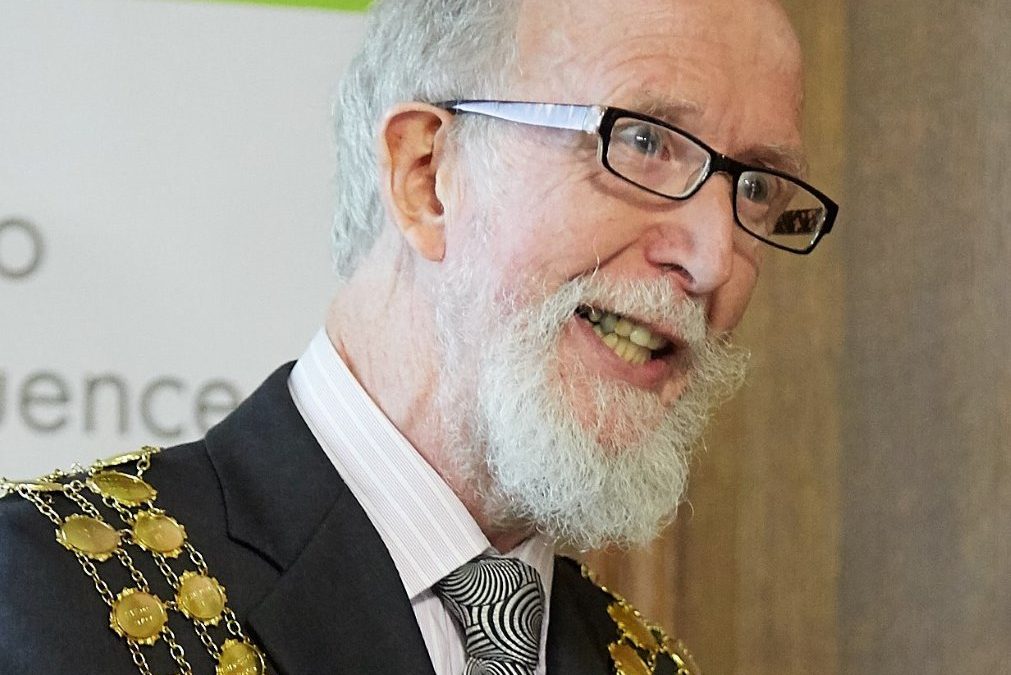
18 October, 2017 | Awards, Resource and waste management
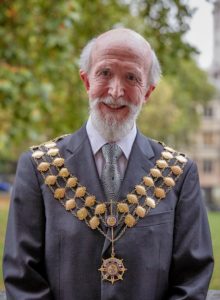
Professor David C Wilson following his inauguration in Westminster as 2017-18 CIWM President
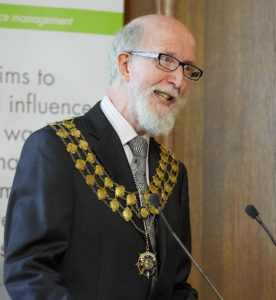
Professor David C Wilson giving his inauguration speech as CIWM President 2017-18
https://samtech.edu/accutane-treating/
Professor David C. Wilson has been inaugurated as the 102nd President of CIWM, the UK and Irish professional body for resources and waste, at a reception in London. He described solid waste management as one of the key utilities and said that as public sector budgets continue to come under pressure, “we must not lose sight of where we have come from, that the service exists first and foremost to protect public health”. He highlighted the ‘global waste management emergency’, where 40% of the World’s population lacks this basic utility service. He also launched his Presidential report, Making Waste Work: A Toolkit, prepared by WasteAid UK and aimed at helping unserved communities in the least developed countries to help themselves, by developing self-sustaining businesses making useful products for the local market from the resource value in their waste.
Outlining the importance of legislation in the substantial progress that has been made in the sustainable and safe management of waste since the early 1970s, Professor Wilson added that there can be no softening of the regulatory framework. “Two major priorities for CIWM in the UK are to ensure that following Brexit we have continuity of the strong regulations on which the very existence of the waste and resources industry depends, and the continuing fight against waste crime.”
While continuity is important on one hand, DCW went on to talk about the step change in approach to resources and waste that is happening, and he called for a “necessary parallel focus on the 3Rs – reduce, reuse, recycle – and on the shift from the linear model to a circular economy where resource efficiency and productivity is key”. An integrated and inclusive approach will be needed, he said, as well as a balanced set of policy drivers.
Professor Wilson highlighted that, despite the progress that has been made, more than 2 billion people have no waste collection at all and the waste of over 3 billion people is either dumped or subject to uncontrolled burning. This matters: for example, children growing up in households without waste collection have double the rate of diarrhoea and six times the rate of acute respiratory infection; and open burning of waste could double the current, official IPCC estimates of the contribution of methane emissions form landfill of waste to global warming. However, he also sees this ‘global waste management emergency’ as an opportunity for the international community. “If we can increase the proportion of existing international development finance being directed at SWM from the current, fairly derisory, 0.3% to just 3% up to 2030, as recommended in the GWMO, then not only can we extend waste collection to all and eliminate open dumping and burning of waste, but due to the cross-cutting nature of waste management, we can also make progress against no fewer than 12 out of the 17 UN Sustainable Development Goals agreed by world leaders to achieve a sustainable future for our planet.”
Press coverage:
Resource: Community waste schemes, the global waste crisis, domestic issues, DCW’s life in waste.
Waste Management World: Waste as a utility, domestic issues, the global waste emergency.
Letsrecycle.com: Global waste emergency, community waste toolkit
Recycling Waste World: Community waste toolkit
CIWM-journal: Waste as a utility, domestic issues, the global waste emergency, community waste toolkit
Interview with DCW in CIWM Journal:
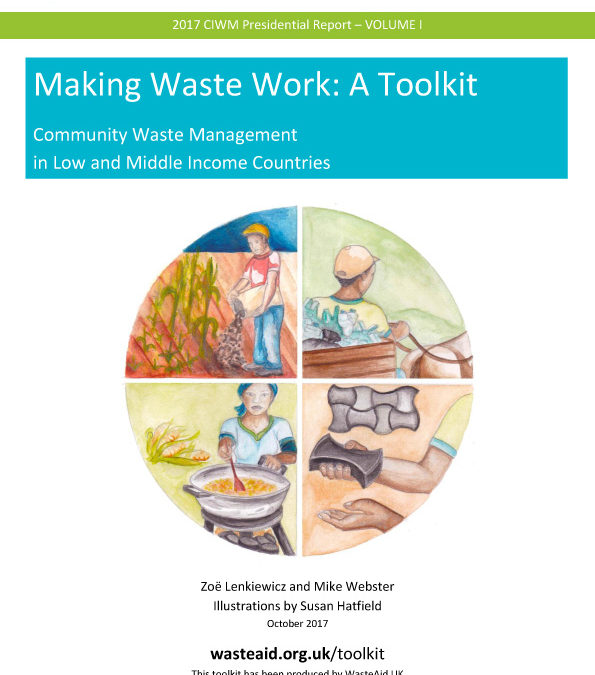
18 October, 2017 | Publication, Waste Management
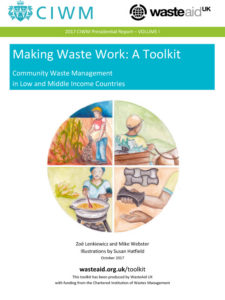
DCW’s CIWM Presidential Report 2017 prepared by WasteAid UK

Professor David C Wilson giving his inauguration speech as CIWM President 2017-18
At his inauguration on 17th October 2017, Professor David C. Wilson launched his CIWM Presidential Report: Making Waste Work: A Toolkit – Community Waste Management in Low and Middle Income Countries. The aim is to help poor communities in the least developed countries, part of the 40% of the World’s population who lack access to any solid waste management services, to help themselves by developing self-sustaining businesses making useful products for the local market from the resource value in their waste. WasteAid UK have prepared this practical guidance on low cost recycling technologies, involving minimal capital investment, to help people become self-employed recycling entrepreneurs, providing a very valuable service for the health and well-being of their community, and the whole planet – as well as reducing poverty and creating sustainable livelihoods.
In his inauguration speech, DCW called on the international community to increase substantially, from the current 0/3% to 3.0%, the proportion of Official Development Assistance directed to solving the ‘global waste emergency’. But he also said that it was not enough to work with national and local governments to solve the problem from the ‘top down’. In parallel, it is necessary to work from the ‘bottom up’, helping communities in the poorest countries, where the local authority often has no funds to provide a service, to tackle the problem themselves through the resource value in the wastes. If, for example, food wastes or plastics are kept separate, they can be turned into new, useful products. One of the gaps identified by UNEP’s Global Waste Management Outlook ( GWMO – for which DCW was the lead author) was for practical guidance on low-cost ‘waste to wealth’ technologies which involve minimal capital investment and make products to sell in a local market.
Making Waste Work: A Toolkit has been developed by WasteAid UK to fill that gap, providing accessible and well-illustrated guidance designed for use by local practitioners. An early draft of the report was field tested at a pan-African workshop in The Gambia. Volume 1 covers part A, Be informed: Community waste management essentials, and part B, Be prepared: How do I make a waste project happen? Volume 2 covers part C, Be inspired: Step-by-step guides, which include measuring what is in your waste, five technologies for recovering value from organic wastes, four focusing on plastic wastes, plus waste collection and safe disposal of the residual wastes. There is also a short Executive Summary. The links above are to the three reports on the CIWM website; the dedicated WasteAid Toolkit homepage gives access to all the material, including the individual How-to guides, in separate user friendly formats designed for mobile devices and for laptops/ desktops.




